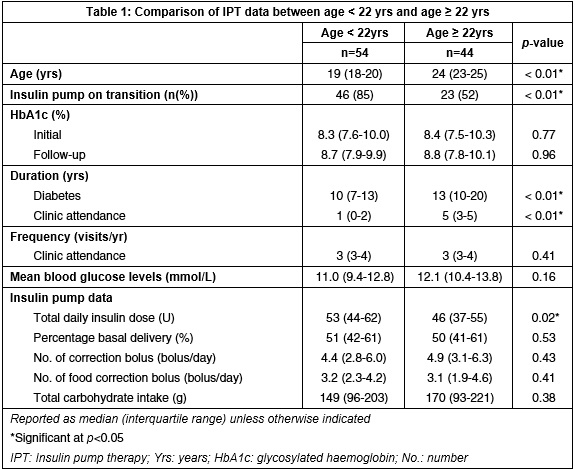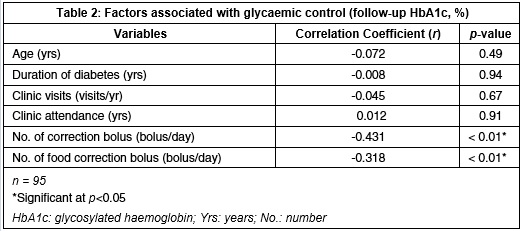Insulin pump therapy practices in young adults with type 1 diabetes in a tertiary hospital young adults transition clinic (#237)
Introduction: Transition from paediatric to adult diabetes care is a high-risk period, when glycaemic control may deteriorate due to maturational changes that adversely impact self-care behaviours in young adults with type 1 diabetes (T1DM). With a growing proportion on insulin pump therapy (IPT), regular attendance at a young adult diabetes transition clinic (YAC) is important to optimise IPT practices and improve glycaemic control. We hypothesised those aged ≥22 years (yrs) have better IPT practices than those aged <22yrs, secondary to an increased ability to perceive the consequences of non-adherence.
Objective: To compare glycaemic control and IPT practices in younger individuals (<22yrs) with older individuals (22-27yrs) attending a YAC.
Methods: IPT records (Diasend and Medtronic) were prospectively downloaded from 98 young adults with T1DM presenting to a tertiary hospital YAC from August 2015 – February 2016. Diabetes duration, clinic visits/yr, initial and follow-up HbA1c were obtained from the clinic database. IPT data between age groups were compared with Mann-Whitney U test. The relationship between follow-up HbA1c, clinic attendance, total and food correction bolus/day were analysed with Spearman’s rank correlation.
Results: Fifty-four IPT patients were <22yrs and 44 were ≥22yrs, representing 80% of all IPT patients attending the YAC. Thirty percent of patients were not on IPT at transition. Table 1 summarises findings and shows no significant difference in either group in initial or follow-up HbA1c, clinic visits/yr or mean blood glucose. Increased number of insulin correction and food correction bolus/day was associated with lower HbA1c. There was no relationship between HbA1c and clinic attendance (Table 2).


Conclusion: Regardless of age, young adults with T1DM on IPT who attended a YAC maintain stable clinic attendance and IPT practices. In contrast to previous publications, maturity did not alter diabetes self-care behaviours and may require comparison with >27yrs to detect improvement in glycaemic control.